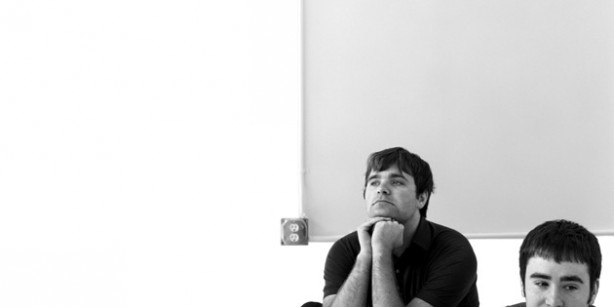 Music
Music
The Postal Service reflect on 10 years of 'Give Up'
by Mark Teo
April 24, 2013
The Postal Service reflect on 10 years of 'Give Up.'
In 2003, the independent music landscape was very, very different. The iTunes store—nevermind Myspace, which launched that year—was in its infancy, meaning that HMVs, Tower Records, and other big-box retailers owned the lion’s share of album sales. Big-beat electronica and electroclash had run their course; indie rock’s resurgence in pop culture, meanwhile, had only begun (even if genre purists were already fascinated and repulsed by how it was handled by The O.C., then in its first season.)
Broken Social Scene’s seminal You Forgot it in People was a year old. The Polaris Music Prize wouldn’t exist for three more years. But that February, Death Cab For Cutie’s Ben Gibbard—who, at that point, considered the bookish Photo Album their breakout album, though the Olympics-scoring Transatlanticism would drop shortly—and Dntel’s Jimmy Tamborello would release an album that would reboot Sub Pop, become one of the decade’s defining LPs, and irreversibly shape Gibbard and Tamborello’s legacies. In 2003, Give Up happened.
I AM THINKING IT’S A SIGN
Here’s the thing about legacies: They’re never created by artists. They’re created by audiences. And in Give Up’s case, the duo barely even tried: The progeny of a one-off electro-pop collaboration (see the above ethereal “The Dream of Evan and Chan” above, which appeared on Dntel’s 2001 album, Life is Full of Possibilities), the Postal Service was a laissez-faire, six-month project completed by correspondence from Seattle, Gibbard’s home base, and L.A., where Tamborello lived. The two, along with honey-voiced Rilo Kiley singer Jenny Lewis, would work on two or three tracks per month, and when the record was released, they only supported it by a handful of performances. Instead of Give Up, the Postal Service could’ve titled the LP Don’t Care.
“We only got to tour right after the record came out. So we didn’t have a chance to play it for a lot of people,” says Tamborello. One of their rare performance, from NPR public radio station KCRW, was documented below.. “But the record comes up almost monthly, and I’m reminded of it all the time—when I get royalty cheques for it, or when it’s playing when I walk into record stores. It really surprises me that people still care about it 10 years later. I don’t put it on at home a lot anymore.”
Tony Kiewel, the head of A&R at Sub Pop and an instrumental figure in the duo’s formation, echoes Tamborello. A one-time college roommate of Tamborello’s—and in the early 2000s, he’d just moved to Seattle, where he also became friends with Gibbard—he says Give Up was the result of both convenience and chemistry. “After ‘Evan and Chan,’ they’d always talked about how easy it was to work together. But they weren’t that close or anything,” says Kiewel. “When they decided to work on a new project together, they initially wanted to make an EP. My pitch was, ‘If you’re going to do an EP, you might as well do a 10-song album—no one cares about EPs. It gets a lot more attention, Sub Pop would be down to put it out, and it gets more attention.’ Everything about the project was super easy, painless, and fluid.”
At the time, the Postal Service was considered to be unambitious—it was meant to be a fun project inspired by Pet Shop Boys and New Order. It was meant to easily blend Tamborello’s glitchy electronic production with Gibbard’s heart-on-sleeve lyricism and penchant for cerebellum-sticking choruses. Even now, Tamborello underplays its significance. “I don’t really know what it leaves the world,” he says. “I guess it’s a good message for bands: You don’t need a big studio and a big budget to make a record that reaches so many people.”
Gibbard agrees. The Postal Service, he plainly told Chicago alt-weekly Time Out last year, was “not a band. This was a thing we did for six months in 2001 and 2002… But I feel very fortunate that it took on such a life of its own. The original conversations with Sub Pop were like, we might press 20,000 copies, and now it’s like you can’t have a retail experience without a Postal Service song on in the background.”
Gibbard’s right. Yet the Postal Service’s legacy, as with all legacies, was out of his hands. Give Up went on to sell more than a million copies—a third of those sold on the U.S. West Coast—and, in an era where pirating reigns supreme, still sells upwards of 1,000 copies per month, according to Kiewel. They became, after a high-profile dispute with UPS, the first band to grace the front cover of the New York Times. Apple, for a TV commercial, reportedly ripped off the video for “Such Great Heights.” They spent an unprecedented 111 weeks on Billboard’s independent music charts. And at their 10-year mark, they’re rereleasing their only LP, headlining Coachella, and embarking on a tour that’ll land them in 20,000-seater arenas[??1] . The Postal Service might’ve been a one-off project, but it dwarfs any project Gibbard or Tamborello have undertaken since.
EVERYTHING LOOKS PERFECT FROM FAR AWAY
When talking about Give Up, there’s a sense that the duo doesn’t fully grasp its significance: Tamborello, for his part, says he doesn’t even have the original files he used to create Postal Service’s songs. He had to reconstruct Give Up’s songs for their upcoming tours. And, he says, the decision to reunite—which was theatrically revealed in January, when their site cryptically posted the message “POSTAL SERVICE 2013”—was anything but dramatic. “I keep on getting asked about the conversation we had [about reuniting],” adds Tamborello. “It happened only a year ago, but I don’t really even remember the tone of it. It was just, as you’d expect, about the album being 10 and wanting to tour on it.”
At the time of Give Up’s release, it didn’t receive much fanfare—according to the label, its peak selling period came in 2004. But Sub Pop’s Kiewel—who, in 2003, was riding a hot streak thanks to Hot Hot Heat’s Make Up the Breakdown, Iron and Wine’s Our Endless Numbered Days, and David Cross’s Shut Up, You Fucking Baby!—understood he was sitting on something special.
“I was naïve and foolish at the time, and I had grand and crazy expectations—this crazy mania, this feeling that anything was possible for Give Up,” he says. “I remember Hot Hot Heat being super explosive, and they sold three times as many records as [Postal Service, Iron and Wine, or Cross].”
He recalls meeting an A&R rep from Warner, too, where he tried to drum up interest in Give Up. “They were trying to sign bands for their next big record. It was not a cool scene,” laughs Kiewel. “They were super flattering, all goo-goo ga-ga over Hot Hot Heat. I was like, ‘You guys are wetting your pants over Hot Hot Heat, but the real story is the Postal Service.’ I played them some songs, and the A&R guys would be like, ‘Oh… That’s…. Nice.’ But it’s too New Order-y.’ One guy even told me they sounded ‘too gay’!”
The Postal Service wasn’t just a fusion of Death Cab and Dntel. Collaboratively, they became something else entirely. That was evident by airplay they received from L.A.’s KROQ and San Francisco’s Live 105, two massively influential pop radio stations that picked up the first single, “Such Great Heights.” “I don’t have a lot of experience collaborating with other people,” Tamborello told me, “but anytime you collaborate with someone, well, two brains are better than one.”
Indeed, it was more than the sum of both minds: Give Up was Gibbard at his wordiest, struggling, as he did on Death Cab’s early work, to cram many syllables into each line. (Try singing, for example, “I was waiting for a cross-town train in the London underground when it struck me” twice over.) It was earnest, and, quite deservedly, earned polite scorn for lyrics like, “Will someone please call a surgeon who can crack my ribs and repair this broken heart?” But it also demonstrated Gibbard’s penchant for endlessly hummable melodies, perhaps at its best during the non-lingual chorus of “Recycled Air.”
“People unfairly write his lyrics off as emo, but in reality, the kid is just hyper-literate,” laughs Kiewel. “He can’t help it, but all his words all mean something, and he’s telling stories that are all connected and grounded and earnest. Maybe it is fair to say it’s emo—but he’s very good at expressing himself.”
Gibbard’s vocal melodies—and Lewis’s, for that matter—became something exceptional when wrapped around Tamborello’s compositions. Even a decade on, it’s surprising how modern they sound: “We Will Become Silhouettes” merges Belle and Sebastian instrumentation over a near-dubstep backbone; “Clark Gable” somehow pairs a four-on-the-floor disco beat with a sweeping, near post-rock soundscape; “Brand New Colony” is chiptune for the singer-songwriter set. (For proof of that, listen to the demo, acoustic version of the track below.) The reason for Give Up’s longevity might be due to the fact that it’s a pop album with plenty to unpack.
“That’s what’s so great about that combination of Jimmy and Ben—Ben brings a really studied, conscious understanding of pop song structure, but Jimmy, he comes from this hardcore and post-punk background,” adds Kiewel. “Ben, when he gets electronics from Jimmy, and he starts carving it up into a more verse-chorus-verse structures, and Jimmy can’t help but make these quirky sounds. You end up with something incredibly innocent, but also wise and big. It’s this combination of the humble and the epic.”
YOU’VE HAD YOUR CHANCE, SO SAY GOODBYE
Which leads to the questions that—literally—Gibbard and Tamborello have to answer in every interview: Why hasn’t there been a follow-up to Give Up?
Here’s the easy answer, and one both men frequently tell journalists: Things got busy. Gibbard managed Barsuk records, launched another high-profile project with Son Volt’s Jay Farrar, and released Plans, Narrow Stairs, and Codes and Keys with Death Cab. Tamborello adopted the persona of James Figurine, and released fistfuls of singles along with Mistake Mistake Mistake Mistake, Dumb Luck, and Aimlessness.
Here’s the tough answer: They were never a real band. “I think people like the idea of a second Postal Service record better than they would like the second Postal Service record,” Gibbard told Spinner writer Ian Gormely. “It’s the desire for something one can’t have, the anticipation of possessing something is more fulfilling than actually having something. People don’t get what the Postal Service was meant to be. It was meant to be for fun. And just because it was so successful doesn’t mean that we have to make another one.”
Which leads us to the interesting answer: No, the Postal Service don’t have to write another album. But they certainly tried. And the additional tracks on Give Up’s re-release—the harder-hitting “Turn Around” and groove-laden “Tattered Line of String—came from writing sessions that happened in 2006. Tamborello adds that they had two other near-complete songs with vocals, which “didn’t hold up as well.” They, along with a handful of instrumentals, were left on the cutting room floor.
We ask Tamborello what LP2 would’ve sounded like. “A lot of the songs didn’t get past the instrumental stage,” he says. “They still have a similar mood to Give Up—I was conscious of them having a melodic playfulness. But they were almost a little tougher and rougher than Give Up, they’re a little rawer and more aggressive, but not metal. They were heavier songs with the same kind of melodies.”
Tamborello doesn’t expect those sessions to see the light of day—he paints those songs as half-finished concepts, and were he to write new Postal Service songs, he’d have to “start all over again.” And, as Gibbard has said over and over, the likelihood of any new Postal Service songs is remote.
“We’re viewing this tour as a sendoff for the project. I’ve gotten to the point where I feel it’s just better to not make any type of statement about the Postal Service, because whatever I say becomes a headline,” laughs Tamborello. “I can say that a new album is possible or impossible—it’ll still become a headline. I’d just prefer to keep it mysterious.”

This article originally appeared in the April 2013 Issue of AUX Magazine.
Download and subscribe for free in the app store.
Tags: Music, Interviews, Ben Gibbard, Death Cab For Cutie, Jenny Lewis, Jimmy Tamborello, Postal Service





